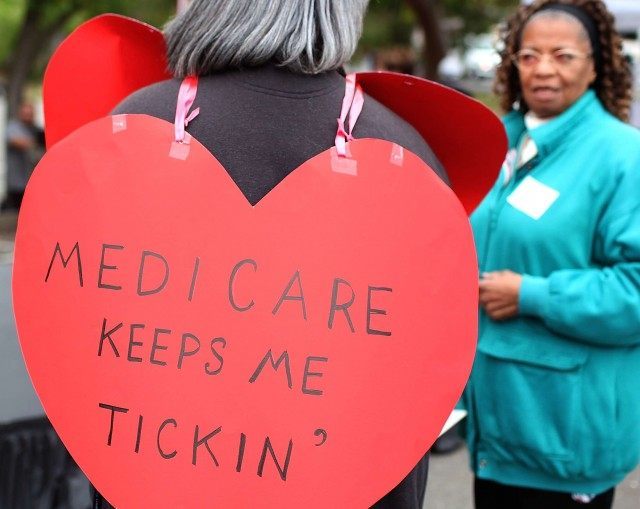On July 30, 1965, President Lyndon Johnson signed Medicare into law and enrolled former President Harry Truman as its first beneficiary. But today, federal unfunded liabilities are catastrophic for future taxpayers and economic growth. The US Debt Clock lists federal unfunded liabilities at $97 trillion. That equals about $818 thousand per taxpayer; about three times average U.S. net worth; and 131 percent of world GDP.
An old joke sums up how most Americans should contemplate this unfunded mill-stone around their neck: “My bank is the worst. They’re charging me money for not having enough money in my account. Apparently, I can’t even afford to be broke.”
The tear-jerker sales pitch for Medicare was that almost half the America’s seniors lacked hospital insurance and had incomes so low they were considered in poverty in 1965. But more important, politically, than protecting the elderly, Medicare guaranteed spectacular revenue to the hospital industry that since the late 1950s has employed more people than the “steel industry, the automobile industry, and the interstate railroads.”
The Medicare expansion in 1965 completed a suite of federal programs that was supposed to protect the wealth and health of people over 65 years old, starting with the Committee on Economic Security of 1934, which is now known as Social Security. At the time Social Security was signed into law, U.S. life expectancy was 59 years of age. By the time Medicare was signed, the life expectancy was about 74 years of age.
Sold as a way to control medical inflation, President Johnson said that with Medicare expanded benefits for seniors, “We have the opportunity to move not only toward the rich society and the powerful society, but upward to the Great Society.”
But exploding medical inflation and deep economic deterioration over the next 15 years caused federal government entitlement spending as a percentage of U.S. gross-domestic-product (GDP) to leap from 5 percent to 13 percent of the economy. To prevent the collapse of Medicare, congressional Democrats were forced to adopt the Reagan Administration’s “prospective payment for diagnostic-related groups” restructure of hospital payments, paying hospitals a predetermined set-fee based on patient diagnosis,.
The Medicare restructure was part of the “Great Moderation” from 1982 to 2007, which followed President Reagan’s tax cuts, deregulation and shrinking of government. That period saw the longest economic expansion since World War II, coupled with very with low inflation. Entitlement spending stabilized as a percentage of GDP at about 13 percent.
Since the “Great Recession” began in 2008, the average spending on entitlements has jumped to over 17 percent of GDP and the U.S. national debt jumped by 72 percent as President Barack Obama added $6 trillion in arrears (versus Bush’s $2.5 trillion).
The first of the 75 million “baby-boomers” hit age 65 in 2011 with a life expectancy of 82 years. But by the time the last boom hits 65 in 2029, the life expectancy will be 84 years. The U.S. Census Bureau predicts 20 percent of the U.S. population will then be on Medicare. The Congressional Budget Office predicts a $1.5 trillion Medicare deficit over the next decade–and then the numbers get much worse.
Compared to their historical averages, the ‘U.S. Labor Force Participation Rate’ percentage has been steadily declining since 2008 for every age demographic age group under 55 years old. The rate is unchanged for 55 to 64 year olds, but the participation rate has grown by over 20 percent for the 65 and older.
One of the reasons that over 65-year-olds are taking jobs from young is that they have Medicare and are exempt from the employer mandated costs of Obamacare. Just like Medicare’s bogus promise to cut medical inflation, Obamacare’s latest deficit projection is $1.21 trillion over the next decade. More importantly, as Breitbart News reported, Obamacare healthcare premiums are spiking by an average of 30 percent next year.
Entitlements are always sold as somehow controlling costs and creating a “Great Society.” But as Medicare and now Obamacare are proving, there is nothing great about unfunded entitlement liabilities that have made the vast majority of Americans “broke as a joke.”

COMMENTS
Please let us know if you're having issues with commenting.